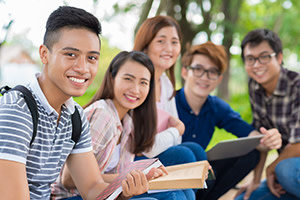 The United States Department of Homeland Security (“DHS”) has announced a new policy related to foreign students studying in the United States full-time online as a result of many academic institutions shifting to virtual classes because of the COVID-19 pandemic.
The United States Department of Homeland Security (“DHS”) has announced a new policy related to foreign students studying in the United States full-time online as a result of many academic institutions shifting to virtual classes because of the COVID-19 pandemic.
According to DHS, all foreign students including those from Vietnam, the Philippines and Taiwan studying under an F-1 and M-1 student visa may not take a full online course load and remain in the United States. The U.S. Embassy in Manila, the U.S. Consulate in Ho Chi Minh City or the American Institute of Taiwan are instructed not to issue visas to those students who enroll in schools/ programs that are fully online for the fall semester of 2020 nor will U.S. Customs and Border Protection permit these students to enter the United States. Plans are underway for DHS to publish new procedures to provide foreign students with additional time to comply with new requirements.
Active foreign students who initially planned to study online while inside the United States on an F-1 or M-1 visa for the fall semester 2020 will be instructed to either depart the United States to avoid violating their visa terms and conditions or transfer to another academic institution with in-person classroom instruction. Foreign students attending schools that use a combination of online and in-person classes will be allowed to continue studying on an F-1 or M-1 visa provided that their school certifies that the course load is not entirely online for the fall semester. These exemptions however do not apply to F-1 students who are enrolled in English language training programs who are required to undergo their entire course load through in-class instruction
Students from Vietnam, the Philippines and Taiwan who intend to study in the United States this fall are encouraged to contact us at info@enterlinepartners.com and speak with a U.S. immigration attorney in Ho Chi Minh City, Manila, and Taipei.
ENTERLINE & PARTNERS CONSULTING
Ho Chi Minh City, Vietnam Office
Suite 601, 6th Floor
Saigon Tower
29 Le Duan Street
Ben Nghe Ward, District 1
Ho Chi Minh City, Vietnam
Tel: +84 933 301 488
Email: info@enterlinepartners.com
Facebook: Enterline & Partners – Dịch vụ Thị thực và Định cư Hoa Kỳ
Website: http://enterlinepartners.com
Manila, Philippines Office
Unit 2507 Cityland 10 Tower 1
156 H.V. Dela Costa Street
Makati City, Philippines 1209
Tel: +632 5310 1491
Email: info@enterlinepartners.com
Facebook: Enterline and Partners Philippines
Website: https://enterlinepartners.com/language/en/welcome/




